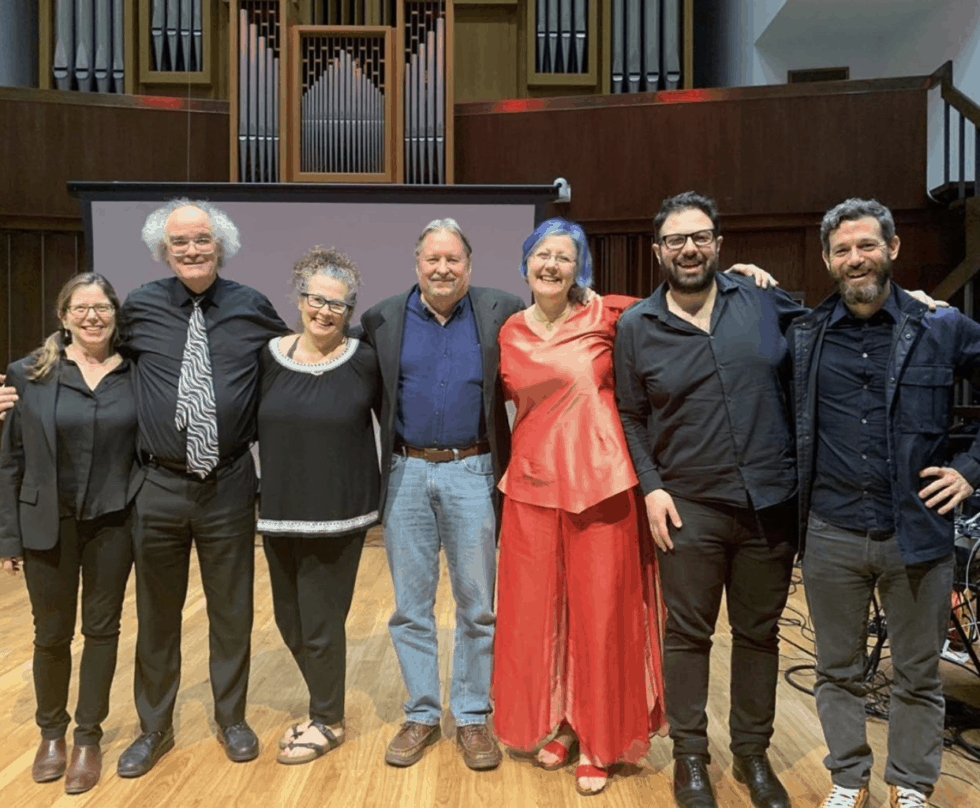
This past weekend, from Friday, January 31, to Saturday, February 1, marked the 28th Annual Ussachevsky Memorial Electro-Acoustic Festival. The event takes place every year at Pomona College’s Lyman Hall in memory of its distinguished alumnus Vladimir Ussachevsky. Vladimir Ussachevsky (1911-1990), PO ’35, was a pioneer in the field of electronic music and co-founder of the Columbia-Princeton Electronic Music Center in New York. Among his early compositions was Jubilee Cantata (1937), performed by the Pomona College Choir and Orchestra to celebrate the College’s 50th anniversary. In 1988 he was commissioned to write To the Young in commemoration of Pomona’s 100th anniversary. He left a bequest to the college to support activities in the field of electronic music, which funded much of Pomona’s current electronic music studio equipment and the founding of the Ussachevsky festival series.
Each year, a number of contemporary classical composers and performers are invited to showcase their latest electro-acoustic pieces and give workshops and masterclasses to the 5C music students. While guests and the contents of every music program shift year by year, the focus on innovation in music remains. For instance, last year’s main attraction was Mari Kimura’s (b. 1962) unique approach to playing the violin which allowed the composer and performer to play significantly below the instrument’s range. Kimura’s demonstration also featured a number of software applications (MAXMsp) for live performance on the violin and various possibilities of visualizing the interplay between performance and its real-time electronic processing.
This year’s guest composer was Christopher Cerrone (b. 1984) of the Peabody Institute at Johns Hopkins, known for scores for a wide variety of instrumental combinations, often including electronics. Alongside works by Cerrone, this festival’s programming featured other music written in the last 10 years, some pieces meticulously notated and requiring challenging and precise synchronization, while others allowed for a wide range of improvisatory freedom. A number of Pomona’s faculty members were involved in performing: Rachel Rudich, flute; Joti Rockwell, electric guitar; Cynthia Fogg, viola; Maggie Parkins and Tom Flaherty, cello; and pianists Genevieve Feiwen Lee and Aaron Kallay. Local all-stars included pianist Nadia Shpachenko and ensembles The Smudges and Brightwork newmusic, violinists Jeff Gauthier and Adrianne Pope, flutist Sara Wass, clarinetist Brian Walsh, and percussionist Yuri Inoo. Fun fact: just a few weeks ago, the very same Nadia Shpachenko who teaches Piano at Cal Poly Pomona, was awarded a GRAMMY for her album of contemporary classical music The Poetry of Places. Shortly after the festival, the pianist posted on her Instagram account @shpachenkonadia: “Had a great time performing Jack Van Zandt’s “Si An Bhru” from my GRAMMY winning album “The Poetry of Places” and hearing many stellar performances/compositions at the 28th Ussachevsky Memorial Festival of Electro-Acoustic Music at Pomona College over the weekend, along with a celebratory photo of herself and a number of composers and performers, including Cerrone, Flaherty, Parkins, Rudich, Llach, and others.
On the second day of the festival, Cerrone gave a lecture demonstration about his work. Pomona’s Music major Jack Szulc-Donnell, PO ‘21, appreciated getting a glimpse of how Cerrone integrated electronics into his compositional process, even with acoustic music: For example, his piece High Windows was the result of layering a ton of samples of a Paganini’s trill from Caprice No. 6 in Logic, but eventually it just became a piece for string orchestra. Cerrone explained this by saying that the boundary between electronic and acoustic music is more porous than it might seem. Earlier on Friday, some composition students could even take the composer for lunch at Frary dining hall. Szulc-Donnell commented on his encounter with Cerrone: “The first thing that jumped out at me about Cerrone was that he was genuinely interested in supporting us as students and composers. As one might expect, he knows a lot about 20th- and 21st-century classical music, but one of the most interesting comments he made at lunch is that the traditional notion of the composer is breaking down, which explains phenomena such as Caroline Shaw co-producing The Life of Pablo album [The Life of Pablo is the seventh studio album by American rapper and producer Kanye West]. This led to a long conversation about Kanye between him, me, and other students. Both event days were followed by festive receptions at the Thatcher Music Building lobby following the Friday night concert, and at Tom Flaherty’s and Cynthia Fogg’s house following the final concert night on Saturday. Pomona student Sarah Wang, PO ’24, expressed fascination with the modern sound of the programming: “One of my favorite parts about [the] Ussachevsky [festival] was how the instruments were live and standard classical instruments, but they produced a sound that was unlike the typical sound that was produced, a hint of electronic elements. The way that the music was performed was interesting as well the whole looping and adding thing. Every single song performed was unique and incredibly cool.” As sad as it is that the contemporary classical cornucopia feast has come to an end, the good thing about it is that it will inevitably happen again next year and for the 29th time, too!
Photo Credit: Nadia Shpachenko, 2020
